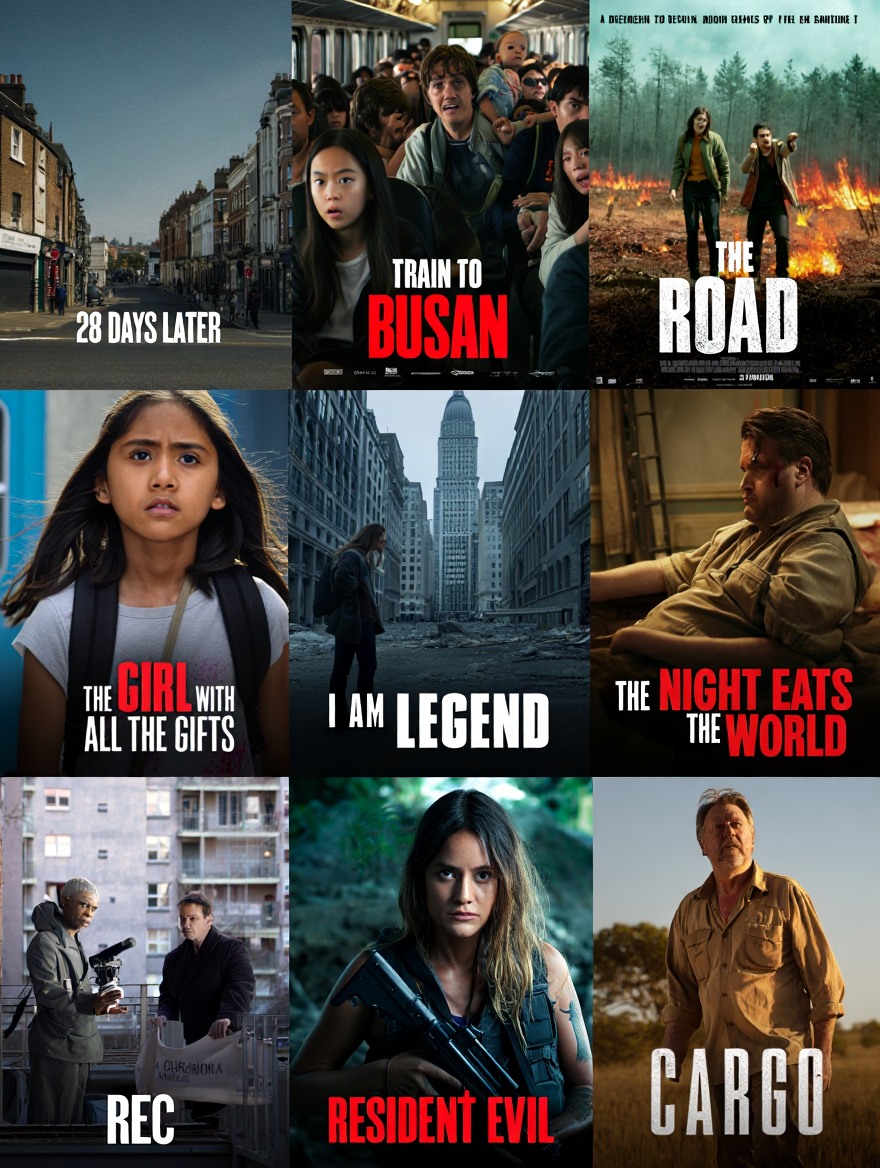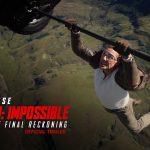Top 9 Disturbing Zombie Survival Movies :

Related Movies:
Related Movies:
Related Movies:
Related Movies:
Related Movies
Related Movies:
Related Movies:
28 Days Later (2002)
Directed by Danny Boyle, 28 Days Later is a chilling and revolutionary take on the zombie genre, blending psychological horror with intense action. The film opens with animal rights activists unknowingly unleashing a highly contagious virus known as “Rage,” which turns its victims into violent, mindless beings.
The story follows Jim (Cillian Murphy), who wakes up from a coma in a deserted London to discover that society has collapsed and the virus has spread rapidly. As he encounters other survivors, Jim embarks on a journey through a devastated and dangerous landscape, where survival becomes more than just avoiding the infected—it’s about navigating the humanity that remains amidst the chaos.
28 Days Later is notable for its atmospheric tension, creating a sense of isolation and vulnerability. Boyle’s direction, combined with John Murphy’s haunting score, amplifies the fear and urgency that permeates the film. The pacing is relentless, and the film’s use of fast-moving zombies redefines the genre, making them terrifying and unpredictable.
The film also explores themes of survival, morality, and the breakdown of society, questioning the true nature of humanity in extreme circumstances. The emotional journey of the characters, paired with the visceral horror, elevates 28 Days Later beyond typical zombie fare.
Rating: 8.5/10 – A fresh and groundbreaking entry in the zombie genre, 28 Days Later combines intense action with thoughtful social commentary and a haunting atmosphere, making it a must-see for horror fans.
Train to Busan (2016)
Directed by Yeon Sang-ho, Train to Busan is a thrilling and emotionally charged South Korean zombie film that stands out for its unique blend of high-stakes action and poignant storytelling. The film follows Seok-woo (Gong Yoo), a workaholic father, who boards a train with his young daughter, Su-an, heading from Seoul to Busan. Unbeknownst to the passengers, a zombie outbreak rapidly spreads across the country, and the train becomes the last refuge for survivors.
As the virus spreads, Seok-woo and other passengers must fight their way through hordes of infected while grappling with their own personal struggles and relationships. Among them is a tough but caring man, Sang-hwa (Ma Dong-seok), who becomes an unlikely hero as he helps protect his pregnant wife and others. The confined space of the train adds an intense layer of tension, with the threat of the infected constantly looming.
What sets Train to Busan apart is its emotional depth. The film is not only a relentless, heart-pounding zombie thriller but also a touching exploration of sacrifice, love, and redemption. The human relationships at the core of the story, particularly the father-daughter dynamic, give the film an emotional weight that resonates long after the credits roll.
Rating: 9/10 – A perfect blend of action, horror, and emotional storytelling, Train to Busan redefines the zombie genre, offering not only pulse-pounding thrills but also a powerful, heartfelt message about the human spirit in the face of disaster.
The Road (2009)
Directed by John Hillcoat and based on Cormac McCarthy’s Pulitzer Prize-winning novel, The Road is a haunting, post-apocalyptic tale of survival, loss, and the unbreakable bond between father and son. Set in a bleak, desolate world where the sun barely shines and the earth is ravaged by an unspecified catastrophe, the story follows a father (Viggo Mortensen) and his young son (Kodi Smit-McPhee) as they journey through this ruined landscape, struggling to survive against the harsh elements, starvation, and violent scavengers.
The film’s atmosphere is grim and oppressive, capturing the suffocating hopelessness of the post-apocalyptic world. The father’s primary goal is to protect his son and provide some semblance of hope, teaching him moral values in a world that seems devoid of any. Along the way, they encounter a variety of characters—some kind, others dangerous—all of whom serve as reminders of the brutal world they are living in.
What makes The Road so powerful is its emotional core. The relationship between father and son is raw and deeply moving, making the film more than just a survival story—it becomes an exploration of humanity, compassion, and the will to survive even when all seems lost. The film’s muted colors, slow pacing, and minimalist dialogue intensify its themes of isolation and the endurance of love.
Rating: 8.5/10 – A deeply emotional and visually striking post-apocalyptic film that focuses on the human spirit in the face of utter devastation. While its pace may be slow for some, its profound themes and performances make it a powerful, unforgettable experience.
The Girl with All the Gifts (2016)
Directed by Colm McCarthy and based on the novel by M.R. Carey, The Girl with All the Gifts offers a fresh and thought-provoking twist on the zombie genre. Set in a post-apocalyptic world overrun by a fungal infection that turns people into “Hungries”—zombie-like creatures—this film explores themes of humanity, survival, and morality.
The story centers around Melanie (Sennia Nanua), a young girl who, along with other children, has been kept in a military facility and studied because she is infected but retains her human intelligence and emotions. When the facility is overrun by the infected, Melanie, along with a group of survivors, including a teacher (Gemma Arterton) and a soldier (Glenn Close), must navigate the dangerous landscape to find safety.
What sets The Girl with All the Gifts apart is its unique perspective, with Melanie as both the protagonist and a symbol of hope for the future. Her internal struggle—being both human and infected—raises important questions about identity, the definition of humanity, and what it means to survive in a world that no longer values life. The film blends elements of horror, science fiction, and drama, with strong performances, especially from Nanua, whose portrayal of Melanie is both haunting and endearing.
Rating: 8/10 – A thought-provoking and suspenseful take on the zombie genre, The Girl with All the Gifts offers a fresh narrative with emotional depth and philosophical undertones, making it a standout in post-apocalyptic storytelling.
I Am Legend (2007)
Directed by Francis Lawrence and based on Richard Matheson’s classic novel, I Am Legend is a post-apocalyptic sci-fi thriller starring Will Smith in one of his most iconic roles. Set in a world ravaged by a genetically engineered virus that has wiped out most of humanity, the film follows Dr. Robert Neville, a brilliant scientist and the apparent last uninfected human in New York City. The virus has turned the majority of the population into monstrous creatures called Darkseekers, who are sensitive to light and driven by a primal hunger.
Neville spends his days trying to find a cure for the virus, using his scientific knowledge and the blood samples he’s collected from the infected. He also struggles with isolation, as he is seemingly the only survivor left, and the mental toll it takes on him is a key part of the film’s emotional core. He’s haunted by memories of his family, and the overwhelming loneliness begins to chip away at his resolve. The film’s tension builds as Neville discovers that he may not be as alone as he thought and that hope for humanity’s survival still exists.
The movie is known for its emotional weight, especially in Smith’s portrayal of Neville, who balances determination and desperation with vulnerability. The cinematography, which showcases a decimated Manhattan, and the eerie atmosphere, contribute to a haunting and immersive experience. I Am Legend also explores themes of survival, sacrifice, and the moral dilemmas that arise in a world where humanity is on the brink of extinction.
Rating: 8/10 – A gripping, thought-provoking post-apocalyptic thriller that blends action with deep emotional resonance. Will Smith’s powerful performance, combined with stunning visuals and an intense, philosophical narrative, makes I Am Legend a standout in the genre.
The Night Eats the World (2018)
Directed by Dominique Rocher, The Night Eats the World is a French post-apocalyptic horror film that offers a unique take on the zombie genre. The story follows Sam (Anders Danielsen Lie), who wakes up one morning in a Parisian apartment to find that a zombie apocalypse has swept through the city overnight. Isolated and alone, Sam must find ways to survive in a world where the undead rule the streets and human civilization has collapsed.
The film focuses on the psychological aspects of survival, with Sam’s struggle against both the zombies and the crushing loneliness he faces in the aftermath of the outbreak. The apartment complex he occupies becomes a sort of prison as he battles with boredom, isolation, and the trauma of being the last survivor. Over time, he attempts to come to terms with his situation, finding moments of humanity in an otherwise bleak and desolate world.
What makes The Night Eats the World stand out is its introspective and slower-paced approach to the apocalypse. Instead of relying on typical action-packed zombie sequences, the film emphasizes the mental and emotional toll of being stuck in a world where everything familiar is lost. Sam’s survival becomes a meditation on the human condition, loneliness, and the instinct to keep going despite overwhelming despair.
Rating: 7.5/10 – A thought-provoking and atmospheric zombie film that focuses on the emotional and psychological impact of survival in a world consumed by chaos. While it may not deliver the traditional action fans expect, its poignant and unique approach to the genre makes it a memorable watch
REC (2007)
Directed by Jaume Balagueró and Paco Plaza, REC is a Spanish found-footage horror film that redefines the zombie genre with its intense, claustrophobic atmosphere and relentless tension. The film follows Ángela (Manuela Velasco), a television reporter, and her cameraman as they accompany a group of firefighters on a routine call to a building in Barcelona. However, what begins as a simple documentary about a night shift quickly spirals into a nightmare when the residents of the building are infected by a mysterious virus that transforms them into violent, uncontrollable creatures.
Shot entirely from the perspective of the camera, the film immerses the audience in the chaos as Ángela and the crew are trapped inside the building, struggling to survive while trying to uncover the truth behind the infection. The confined space of the apartment building heightens the sense of dread, as the characters are unable to escape and are constantly pursued by the infected. The quick pacing, combined with the documentary-style camera work, creates a visceral experience that keeps viewers on edge from start to finish.
REC is praised for its raw intensity, realistic performances, and the sense of urgency that comes from its first-person point of view. The suspense builds relentlessly as the mystery behind the infection deepens, and the film expertly blends horror with moments of high-stakes action and psychological terror.
Rating: 8/10 – A truly terrifying, adrenaline-fueled film that revitalizes the zombie genre with its innovative found-footage style. REC is not just about jump scares—it’s a heart-pounding, immersive experience that delivers both horror and intense emotional stakes











